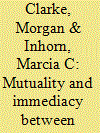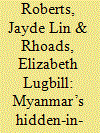| Srl | Item |
| 1 |
ID:
106946


|
|
|
|
|
| Publication |
2011.
|
| Summary/Abstract |
This article concerns the dominant institution of religious authority within modern Usuli Twelver Shi?i Islam: the marja?iyya. The most senior clerics serve as "sources of emulation" (mara-ji? al-taqli-d), informing the moral conduct of their lay "imitators" (muqallidu-n). Despite the importance of this relationship, academic writing on what we call its "affective" qualities, especially from lay perspectives, is limited. We provide ethnographic data from anthropological research into Islamic medical ethics in Lebanon. Interviews in 2003 with infertile Shi?i patients who were considering controversial assisted reproductive technologies revealed rare insights into which authorities they followed and in what numbers and how this relationship was experienced and drawn upon by those in need. We compare the very different relationships inspired by the two authorities most cited in our study: the late Beirut-based Ayatollah Fadlallah; and the Iranian Ayatollah Khamina?i, Hizbullah's patron. From his local base, Fadlallah offered a vivid and responsive persona of a qualitatively distinct type.
|
|
|
|
|
|
|
|
|
|
|
|
|
|
|
|
| 2 |
ID:
184143


|
|
|
|
|
| Summary/Abstract |
This article examines nalehmu, a set of informal relational practices for negotiating power across scales which have facilitated access and enforced accountability through mutually recognized norms and social sanctions in Myanmar. Like Asef Bayat’s “quiet encroachment” in the Middle East, nalehmu is Myanmar’s discreet and prolonged practice of agency that has enabled ordinary people to survive and better their lives despite the multiple ruptures in Myanmar’s history, as seen most recently in the February 2021 coup d’état. The paper analyzes how nalehmu serves as a hidden-in-plain-sight social infrastructure across three different scales: relations of mutuality, obligation, and reciprocity between individuals; implicit connections for accessing goods, services, and recognition; and a means of interacting with the state via the nalehmu economy. This analysis seeks to do more than add a different case to studies of urban Southeast Asia, but also to help produce further theorization that takes seriously the actually existing contexts and practices in the global South.
|
|
|
|
|
|
|
|
|
|
|
|
|
|
|
|